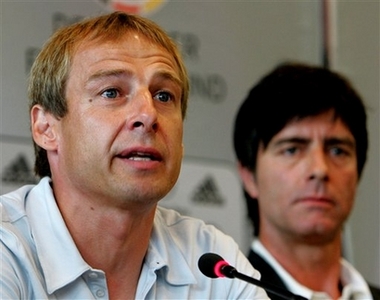Juergen Klinsmann has broken the hearts of millions of adoring German fans
who begged him to stay on as coach after he led his unfancied team to an
improbable third-place finish at the World Cup.

Coach of German
national soccer team Juergen Klinsmann has tears in his eyes during a
press conference in Frankfurt, central Germany, Tuesday, July 12, 2006.
Klinsmann stepped back from his post as national coach. Joachim Loew,
right, will be his successor. [AP] |
But those close to the unpredictable and unconventional coach were
half-expecting Klinsmann would opt not extend his contract after a two-year
roller-coaster ride in which he was loved, then loathed and then loved again in
his home country.
It was less a matter of Klinsmann wanting to go out on top after Germany's
fairytale run to the World Cup semi-finals and more an issue that he was simply
fed up with the resistance, sniping, back-stabbing and second-guessing.
"It was anything but an easy decision but one I had to make," Klinsmann told
a news conference in Frankfurt on Wednesday.
"My great wish is to go home to be with my family, to return to a normal life
with my family," said Klinsmann, his voice quivering as he fought off tears.
"A further important reason is that, in the wake of these two years, I've
lost a lot of strength (dealing) with the functionaries and at this moment I
don't feel able to continue this work. I feel internally burned out. I owe it to
myself to take a six-month holiday now. I won't do anything else."
In the last two years the free spirit from Stuttgart did much to shake up the
stuffy German football association (DFB) on his twice-monthly trips from his
adopted home in California. His reforms caused great pain and losers were bent
on revenge.
The novice coach lifted a team humiliated at Euro 2004 off the ground with a
refreshingly bold vow to win the World Cup when he was hired two years ago --
after two other candidates turned down the job.
Klinsmann's critics were temporarily silenced during the World Cup. All 23
players urged him to stay and an unprecedented 95 percent of the public told
pollsters he should stay.
But Klinsmann could not forget the DFB enemies who wanted him sacked after a
4-1 loss to Italy in March and the 60 percent of the public who agreed -- three
months before the World Cup.
He could also never forget the sniping from former German soccer greats such
as Franz Beckenbauer and the powerful mass media campaign stirring up resentment
over his decision to live with his family in California and commute to Germany.
"At the end of the day the only thing that matters is the quality of the work
you deliver," Klinsmann said in a Reuters interview last year as he sat
blissfully anonymous at a California sidewalk cafe without anyone recognising
him.
"The world has changed with modern communications so it doesn't matter where
you are physically," he said. "Wherever in the world I am, I can stay hooked up
to Germany. What difference does it make if I phone a player from California or
Frankfurt?"
But it did matter to the traditionalists in Germany, already upset by
Klinsmann's changes. They did not like the U.S. fitness trainers he brought in,
nor the Swiss scout he hired, and they were sceptical of his attack-style
football.
When Klinsmann wanted to hire Germany's field hockey trainer Bernhard Peters
to introduce new thinking into the DFB in February as sport director, his
enemies drew the line. Peters was blocked and a Klinsmann rival, Matthias Sammer
hired.
Klinsmann asked Sammer not to attend the friendly in Italy in March over
concerns it would fuel media speculation that Sammer would replace him on the
bench. Sammer refused. It seemed to be a final straw for Klinsmann.
Although he left open the question about whether he would extend his contract
until Wednesday, Klinsmann was nevertheless sending subtle messages he might
leave.
"We've started a reform process that is independent of any trainer -- me or
anyone else. It's a philosophy that will carry on no matter who is in charge,"
he said in Berlin last week.
Coming from a man who is close to his family, cherishes his anonymous
lifestyle in California and does not need the money, it seemed clear which way
he was leaning. The open question was whether the huge tide of public frenzy
might prompt him to stay.
Klinsmann leaves with a record of 21 wins, seven draws and six defeats in his
two years in charge.
As a player, he won 108 caps and scored 47 goals. He won the World Cup in
1990 and the European Championship in 1996.
Klinsmann was footballer of the year in Germany in 1988 and 1994. He won that
honour in England in 1995.